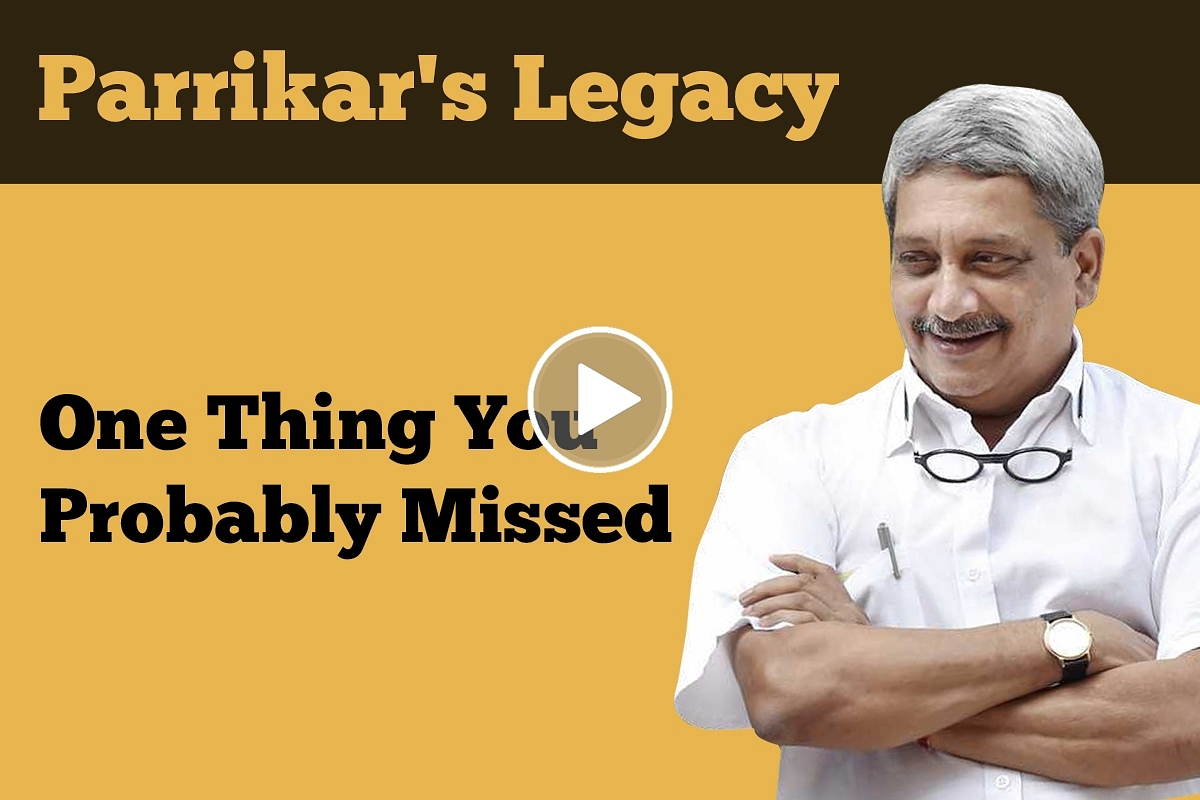Videos
One Thing Manohar Parrikar Should Certainly Be Remembered For

If there was one big change during Parrikar’s tenure to highlight...
Transcript:
Media houses have spent considerable energy over the last couple of days drawing up a laundry list of Manohar Parrikar’s achievements, and the lack thereof, in the wake of his passing.
While that is a useful exercise, what gets lost in the mix are the really significant changes that perhaps led to the opening of doors that were previously closed.
In Parrikar’s case, we’d like to zoom in on that one significant change during his tenure that had that effect - and it is to do with preventing yet another Union government from shooting itself in the foot.
Let’s go back to the 1980s. The Bofors scandal came to light, with allegations of corruption against the then Congress government in its deal with the Swedish firm Bofors. Under pressure, the Congress government blacklisted Bofors in 1987.
This ban stayed on, till it was lifted eventually in June 1999 at the height of the Kargil conflict, when the army was desperate for spare parts of the Bofors guns, which were performing exceptionally well.
For all those years, India had blocked access to spare parts of weapons that it had purchased at such a high price!
Similarly, the blacklisting of HDW in 1987 had left the Indian Navy in a bind for years. We had purchased two conventional submarines from the German firm before banning them. And guess what? Two more of the submarines joined the fleet by 1994.
So what we had were four submarines but no way to keep this fleet running. Why? Because India had blacklisted HDW. The Navy’s inability to deal directly with the supplier not only forced it into making deals with dubious firms to keep the fleet running, but also to delay its upgrades, leaving the HDW production line sitting idle at Mumbai’s Mazagon Dock Shipbuilders.
And then, more recently, there was AgustaWestland, the firm which had allegedly paid bribes to win a $750 million deal to supply helicopters to India for use by VVIPs.
Once the scam surfaced during the UPA era, the then defence minister, A K Antony, banned not just AgustaWestland - the maker of the helicopters - but the entire group - Finmeccanica - of which it was a part.
This whimsical blacklisting cost the Indian Navy dearly, as it had to operate its Scorpene-class submarine, INS Kalvari, and nuclear submarine INS Arihant without heavyweight torpedoes. The torpedoes contracted for, were built by WASS, a subsidiary of Finmeccanica. And torpedoes are, after all, a submarine’s principal weapon system.
At the moment, the Kalvari class submarines and INS Arihant are relying on old, unreliable torpedoes for their operations.
There are many more examples that we can go into, but the point is the same - successive governments have tried to operate with one hand tied behind their back - and they themselves did the tying.
India’s blanket approach to blacklisting has narrowed its choice of weapon platforms, leading to indirect monopolies and single-vendor situations, where India has had to cough up more than the market rates. In some cases, there were no alternatives, and the forces were found searching for more. Under the UPA, this blanket blacklisting virtually stalled the modernisation drive.
Then, after all those years of struggle, it was during Parrikar’s two and a half years at the Defence Ministry that the government first took a hard look at this policy.
The new policy did away with the blacklisting of entire conglomerates and replaced it with tough financial penalties on firms found guilty of wrongdoing. According to the policy, these companies would be blacklisted only for one year at a time, if required, instead of the UPA-era norm of 10 years at a go, with fast-track investigations into corruption charges levelled against them.
In this way, Parrikar enabled a change in policy that has significantly improved our defence preparedness and has ensured that we don’t, by ourselves, block access to our critical defence needs.
Introducing ElectionsHQ + 50 Ground Reports Project
The 2024 elections might seem easy to guess, but there are some important questions that shouldn't be missed.
Do freebies still sway voters? Do people prioritise infrastructure when voting? How will Punjab vote?
The answers to these questions provide great insights into where we, as a country, are headed in the years to come.
Swarajya is starting a project with an aim to do 50 solid ground stories and a smart commentary service on WhatsApp, a one-of-a-kind. We'd love your support during this election season.
Click below to contribute.
Latest